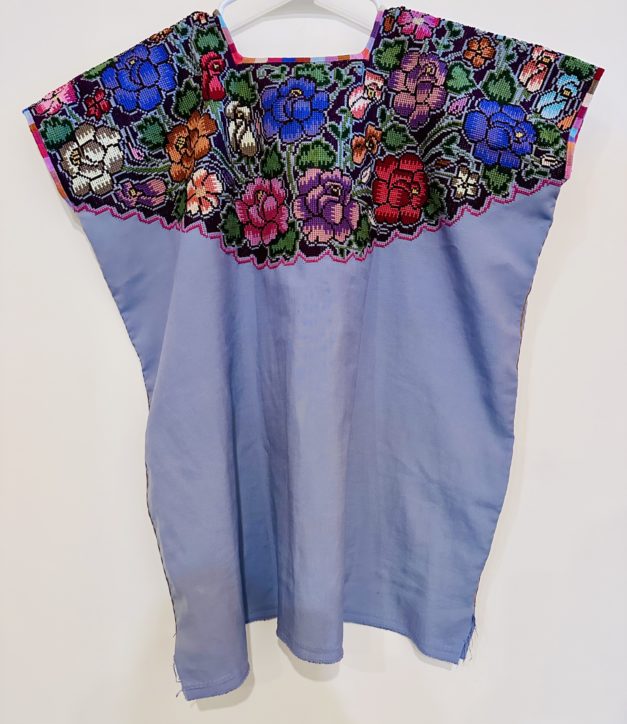The day is cloudy, overcast. A mist hangs on the hills like a coverlet. It’s late February, still chilly with winter in the Chiapas Highlands. Fuzzy wool cape weather, even in the early afternoon. After our visit to Tenejapa for the Thursday market, we make a stop at Romerillo before returning to San Cristobal de las Casas.
Notice: 2018 Chiapas Textile Study Tour is Full.
I am taking a waiting list. Email me to add your name.
Romerillo is a tiny hamlet with an impressive cemetery. The stand of turquoise blue Maya crosses carved with ancient symbols are sentries, erect on the crest of the hill. Tethered sheep graze at the base. We get out of the van and walk slowly to enter sacred space.
We moved in a matter of a few miles from textile sensory overload to quiet meditation. After our guide introduces us to the Maya world of death and life, we each walk silently, separating, alone, stepping across dried pine needles, around the mounds of earth designating grave sites. There are things to think about.
One of us gets a call to come home to tend to her mother’s dying. Another suddenly loses a brother-in-law just days before. Most of us quietly mourn a parent, a husband, friend, perhaps a child, a relationship.
It’s months past the Day of the Dead season. There are remnants of marigolds, fresh fruit dried by the sun, graves covered by wood planks to keep the dead secure in their underworld habitat until the next uncovering.
The mounded burial ground: scattered pine needles, dried pine boughs tied to the Maya crosses, toppled flower pots, an empty coke bottle, a tossed aside cigarette butt, an overturned flask once filled with pox (pronounced posh), a fresh grave.
(Mary Randall reminds me that the Romerillo hill was featured in the indie film, El Norte, a testimony to the Maya struggle for independent identity.)
How do I know of this recent burial? From the lingering aroma of copal incense, scattered green pine needles, flowers still too fragrant in their urns.
Life and death blend together in Maya ritual. The mounds bridge the gap between heaven and earth. Fresh pine boughs are the portal to the other world. There is afterlife, often reincarnation depending on status. Memory must be kept, attended to. Here is ancestor worship — generations buried in the same space. The pine needles represent infinity, too numerous to count.
The blue and green crosses are symbols, too, portals of entry for contact with the ancestors. Mayans believe the ancestors are guides and give them counsel in their problems when asked. Blue is significant throughout the Maya world.
On November 1, Day of the Dead, family members lift off the wood planks. Sit around the grave sites of their loved ones, carry on a conversation. There are elaborate rituals here that bring people closer to the natural world. The sun, moon, earth, stars are imbued with meaning, embedded in all that exists. Everything has a purpose, is connected.
Some of us sit. Others walk. The tall crosses guard the land. Small crosses guard each grave. Sometimes I see several crosses marking one grave site. I know from my experience in Oaxaca that each identifies one person in this resting place, that ten years must pass before another can be buried in the same space. There is continuity on this path.
Notice: 2018 Chiapas Textile Study Tour is Full.
I am taking a waiting list. Email me to add your name.


















8 responses to “Chiapas Notebook: Maya Cemetery at Romerillo”